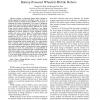Free Online Productivity Tools
i2Speak
i2Symbol
i2OCR
iTex2Img
iWeb2Print
iWeb2Shot
i2Type
iPdf2Split
iPdf2Merge
i2Bopomofo
i2Arabic
i2Style
i2Image
i2PDF
iLatex2Rtf
Sci2ools
ICRA
2005
IEEE
2005
IEEE
Energy-Saving 3-Step Velocity Control Algorithm for Battery-Powered Wheeled Mobile Robots
— Energy of Wheeled Mobile Robot (WMR) is usually supplied by batteries with finite energy. In order to extend run-time of battery-powered WMR, it is necessary to minimize the energy consumption. The energy is dissipated mostly in the motors, which strongly depends on the velocity profile. This paper investigates energy efficiency for typical 3-step velocity control methods to minimize a new energy object function which considers practical energy consumption dissipated in motors related to motor dynamics, velocity profile, and motor control input. We performed analyses on energy consumption for the four typical 3-step velocity profiles: S-C-S, T-C-T, S-C-T, and T-C-S (S is an acceleration/deceleration section by step control input, T is an acceleration/deceleration section by acceleration/deceleration phase of trapezoidal velocity profile, and C is a cruise section with a constant velocity). Also we suggested an efficient iterative search algorithm with binary search which can...
| Added | 25 Jun 2010 |
| Updated | 25 Jun 2010 |
| Type | Conference |
| Year | 2005 |
| Where | ICRA |
| Authors | Chong Hui Kim, Byung Kook Kim |
Comments (0)

